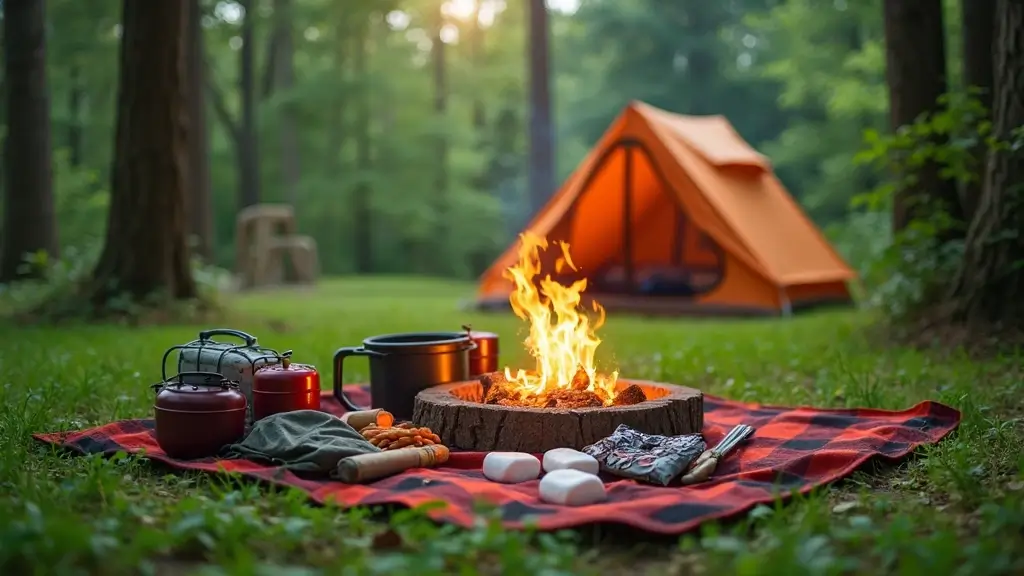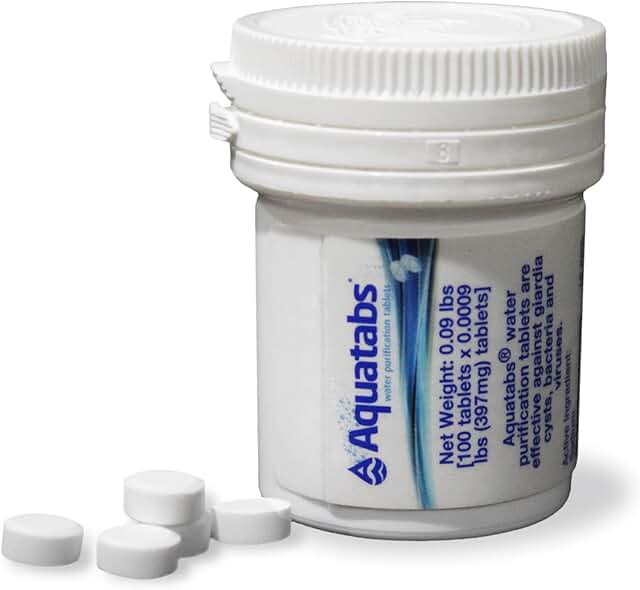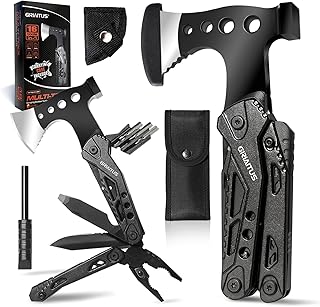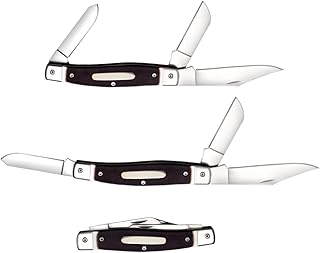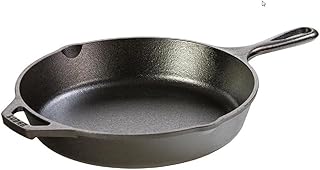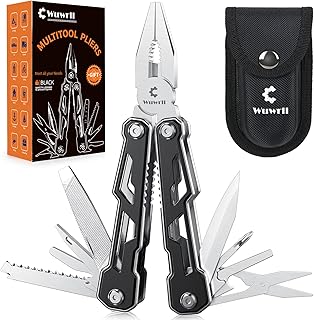Camping trips look simple until you start packing. Those tiny items often decide how comfortable your night is. I made this post because I kept discovering gear that saves the trip but is easy to forget. If you want smoother mornings and lighter loads, this guide is for you.
Who is this for? If you are new to camping, a weekend warrior, or you camp with family, this is for you. You care about gear that works in real life and doesn’t fill your pack with fluff. You want results you can feel on the trail, not just hype.
What you’ll get is a prize worth carrying. I pulled together 12 essential camping gear items, chosen for ease, usefulness, and value. They cover comfort, safety, and simple setup for many trips. And Number 5 will blow your mind with how small it is and how big a difference it makes.
These items help you set up faster, stay warm, and keep your space clean. You can mix and match them for a day trip or a weekend under the stars. Picture the warm glow of a small lantern, the pine scent in the air, and a dry pocket for your essentials. Think sturdy materials, simple use, and gear you will actually reach for.
I’ll show you why each piece belongs in a pack, how to use it on site, and when to bring it. You won’t need fancy gear to see real benefits. This guide focuses on real hikes, family trips, and car camping.
Ready to dive in? Start with one or two picks, test them on a short trip, and note what changes. By the end, you will pack with confidence and still have room for snacks. Now let us begin this simple guide to camping gear that makes sense on the trail.
1. Portable Water Filter Straw
You need to stay hydrated on the trail. Heavy bottles slow you down. A portable water filter straw makes it easy. You can sip water from a stream or lake without adding bulky bottles to your pack.
Why you’ll love it:
– Lightweight and compact
– Lets you drink directly from water sources
– Cuts down on plastic waste
– Great for hiking, camping, or a bug-out kit
Here is how it works in the real world. You dip the straw into clear water. You place the mouthpiece to your lips and take a slow sip. Water comes out smooth and clean. When you’re done, rinse the straw with a little clean water and air-dry it. Stash it back in your pack ready for the next stop.
Safety and limits matter. Most filters remove bacteria and protozoa. They may not catch every virus, so know your water source. For muddy water, a quick pre-filter or cloth pour helps. Don’t rely on one tool alone in rough conditions.
What to look for when buying. Choose a model with proven microfiltration or hollow fiber tech. Check the flow rate so you can drink without waiting. Pick durable plastics or silicone that handle a rough trip. See if it supports easy cleaning or backflushing.
Next steps. Try it at home first with a safe water source. Pack one in your day bag. Pair it with a small bottle for quick refills, and you’re ready for close calls and long days on the trail.
1. Portable Water Filter Straw
Editor’s Choice
LifeStraw Personal Water Filter for Hiking, Camping, Travel, and Emergen…
Collapsible Water Bottles 20.6oz, Silicone Foldable Portable Travel Wate…
Aquatabs 397mg Water Purification Tablets (100 Pack). Water Filtration S…
2. Solar-Powered Camp Lights
Want light after sunset without hauling batteries or a noisy generator? Solar powered camp lights answer that need. They soak up sun by day and glow softly at night. You get a warm, welcoming camp vibe without extra work.
What to look for
– Durability: choose waterproof shells that resist rain and dew.
– Brightness levels: pick models with adjustable settings so you can soften the glow for conversations or boost it for chores.
– Recharge time: some lights charge fully in a few hours. Look for quick charging so you’re ready when night falls.
Smart features that help in the wild
– Hooks or stakes let you hang lights from trees, the tent, or a gear rack.
– Multiple modes give you a gentle nightlight or a bright lantern for cooking.
– Solar panels on top catch sunlight even if the campsite is shaded.
Here is why you’ll love them. You can place a light high to spread glow over the entire site, or keep a small one near the table for late-night cards. The soft amber color feels cozy and invites stories, marshmallows, and s’mores.
Next steps: test a light at home in direct sun, then hang it during your next trip. If nights stay cloudy, consider keeping a spare compact lantern as a backup. Solar camp lights work best when you plan ahead and place them where sun hits them most.
2. Solar-Powered Camp Lights
Editor’s Choice
Collapsible Portable LED Camping Lantern XTAUTO Lightweight Waterproof S…
Brightown 108FT Solar String Lights Outdoor with Remote and 52 LED Shatt…
Collapsible Portable LED Camping Lantern XTAUTO Lightweight Waterproof S…
3. Multi-Use Camping Tool
You’re tired of lugging a heavy toolbox on every trip. The trail needs gear that travels light and works hard. A multi-use camping tool can be the one item you actually reach for, again and again.
What it includes
– A sharp knife for food prep and quick fixes
– A screwdriver with bits for tiny repairs
– A can opener for camp meals
– A bottle opener for drinks around the fire
Key Benefits
– Space Saver: It fits in a pocket or pouch.
– Versatility: It handles cooking, repairs, and campsite setup in one go.
– Durable Materials: Stainless steel resists rust and lasts longer.
Here is why this tool helps in the wild. It keeps your pack lighter and your mood steady. You can fix a torn tent seam, open a stubborn can, or trim a loose cord in minutes. The metal feels solid, and the grip stays steady as you work.
Tips for choosing and care
– Choose a model with a locking blade for safety.
– Look for stainless steel and a sturdy handle.
– Clean and dry it after use to prevent rust.
– Store it in a sheath so it doesn’t snag on gear.
Next steps. Pick a tool, learn three core tasks, and test them at home before your next trip on the trail.
A multi-use camping tool is your pocket-sized hero on the trail—saving space, tackling tasks, and making every adventure easier. Don’t just pack light; pack smart!
3. Multi-Use Camping Tool
Editor’s Choice
Camping Essentials 16 in 1 Multitool Camping Gear Gifts for Men Dad Mult…
Cold Steel Stockman Versatile Practical Durable Reliable Compact Pocket …
4. Campfire Cooking Kit
You want meals that taste great around the campfire, without a pile of gear to juggle. A campfire cooking kit can make that happen. It bundles essential outdoor cookware, including pots and pans, a grill grate, and the utensils you need for use over open flame.
What to Look For:
– Material: Stainless steel or cast iron for durability and even heat.
– Storage: Compact design that fits in a bag for easy transport.
– Extras: Lids, a spatula, tongs, and a grill grate. Some sets add a simple recipe guide or spices.
With the right kit, you can cook more than hot dogs. You can boil water, fry eggs, simmer soups, or saute vegetables. All in a small kit keeps meals tasty and nights memorable.
Here is why a good campfire cooking kit matters. It puts all your tools in one place. It protects them from dirt and rain. It gives steady heat and easy cleanup. It also teaches you small tricks for even cooking.
Next steps: Compare a few kits, read reviews, and pick one that fits how you cook. Practice at home first, then pack it with your other gear. On your next trip, you will have a ready set that makes meals easier.
With a little care, this kit will ride with you through many camps.
Cooking over a campfire isn’t just about food; it’s about creating memories. With the right campfire cooking kit, every meal can be an adventure worth savoring!
4. Campfire Cooking Kit
Editor’s Choice
KingCamp Camping Cookware Set 304 Stainless Steel Campfire Cooking Pots …
Lodge 10.25 Inch Cast Iron Skillet – Pre-Seasoned Frying Pan with Teardr…
Amazon Basics Heavy-Duty Portable Camping Grill Grate for Campfire Cooki…
5. Portable Solar Charger
Are you trying to stay charged without hunting for outlets? A portable solar charger is your sun‑powered helper. It slips into your pack and keeps your devices alive when you’re off the grid.
Why you’ll want one:
– Sustainability: It cuts the need for disposable batteries.
– Convenience: No more dead phones during hikes or late‑night calls.
– Versatility: Most models have several ports; some even store power for later.
How it works is simple. You lay the panel in bright sun. The sun powers the charger to push power to your phone, GPS, or tablet. Some models have a built‑in battery, so a cloudy moment won’t wipe you out.
What to look for when buying:
– Size and wattage: 5–10 watts charges phones; 20 watts charges tablets faster.
– Ports: USB‑C helps newer gear; USB‑A covers older devices.
– Durability: Choose weather‑resistant materials and a rugged cover.
– Weight and foldability: A compact fold keeps your pack light.
Tips to use it well: set it in direct sun, angle the panel toward the sky, and keep it clean. It shines on sunny days and works slower when clouds roll in.
Next steps.
5. Portable Solar Charger
Editor’s Choice
Power-Bank-Solar-Charger – 42800mAh Portable Charger,Solar Power Bank,Ex…
6. Emergency Blanket
Cold nights on the trail can slow you down. A space blanket, also called an emergency blanket, slips into your pack and comes to the rescue.
This thin, reflective sheet weighs almost nothing. It traps your body heat and blocks cold wind from your skin. It helps prevent hypothermia when temps drop.
Key features
– Lightweight and compact: almost no weight.
– Many uses: warmth, ground cover, or first aid wrap.
– Reflective surface: easy to spot if you need help.
You may think you won’t need it. This small sheet sits in your pack ready to act. It helps you stay warm inside a sleeping bag, on dry ground, or as a temporary shield from wind.
How to use it
– Warmth boost: wrap it around your chest or tuck it inside your sleeping bag to trap heat.
– Ground protection: lay it on damp ground to stay dry and clean.
– Signaling: hold it up in the sun or lay it on a trail to catch a lookout’s eye.
Quick care tips
– Keep it flat in a side pocket so you can grab it fast.
– Check for tears before trips and replace worn sheets.
– In real cold, pair this with real insulation.
Tiny and bright, this blanket adds more safety to your trips.
6. Emergency Blanket
Editor’s Choice
Emergency Blankets Mylar Thermal Blanket,(10 Pack) of Gigantic Space Bla…
Camping Sleeping Pad, Ultralight Camping Mat with Pillow, Built-in Foot …
You might also like
7. Portable Campfire Pit
Think about warmth and stories by a flame without hauling in a ton of wood. A portable campfire pit gives that glow in a compact, safe package. It travels easy, sets up fast, and packs away in minutes.
Here is why it helps on trips:
– Advantages: Safety: Flames stay inside a metal bowl. Sparks stay low. Cleanup is quick.
– Convenience: Quick setup and takedown. You can chase spontaneous campfire fun.
– Cooking: Many models take a grill grate or fit a small pot for snacks and meals.
Next steps to pick and use one:
– Size and weight matter. Choose a model you can carry in a backpack or car.
– Materials last. Steel and stainless steel hold up well. Some have enamel coating for easy clean and rust resistance.
– Fuel type. Wood burning for a classic crackle; gas for a clean, fast restart.
– Maintenance. Look for an ash tray and a grate that wipes clean.
How to use it well:
– Find flat ground away from tents and low branches.
– Have water nearby. Check wind and stay in control.
– Keep kids and pets back. Never leave it unattended. Let it cool fully before moving.
Limitations to note:
– It isn’t a full campfire. It sets a mood and adds warmth, but you must follow local rules.
7. Portable Campfire Pit
Editor’s Choice
Radiate XL 8″ Portable Campfire As Seen On Shark Tank – Up to 2 Hours of…
Amazon Basics Heavy-Duty Portable Camping Grill Grate for Campfire Cooki…
Alocs Portable Camping Cookware – Upgraded Handle, Non-Stick Camping Pan…
8. Lightweight Hammock
After a long day on the trail, you want rest fast. A lightweight hammock gives that comfort in minutes. It packs small and sets up between trees with little effort.
Why a lightweight hammock helps
– Comfort: it cradles your body and eases sore muscles.
– Portability: under a pound, easy to carry.
– Versatility: use it on the trail, in your yard, or at the beach.
Parachute nylon dries fast and packs small. Look for strong stitching, a good weight rating, and rugged straps. A longer size fits taller campers and keeps the fabric flatter.
How to choose and use
Pick a hammock built for outdoors. Nylon dries fast; cotton is softer but heavier. Pair it with bark-friendly straps. Check the weight rating. Add a light tarp for rain and a thin blanket for cool nights.
Here is how to set it up fast:
– Find two sturdy trees about 12 to 15 feet apart.
– Wrap straps around each trunk and clip the hammock ends.
– Adjust the sag to a gentle dip and test by sitting on the edge.
– Keep the bottom a few inches off the ground.
Next steps: practice at home, then tweak height in camp.
Use it for a quick lunch break or a starry nap. You stay dry and comfortable, and you see the woods from a new angle.
Care and packing: dry after rain, fold it flat, and store in a small bag.
8. Lightweight Hammock
Editor’s Choice
Durable Hammock 400 lb Capacity, Nylon Camping Hammock Chair – Double or…
MalloMe XL Hammock Straps for Trees – Hammock Tree Straps Set 2000+ LBS …
Wise Owl Outfitters Hammock Rain Fly – Waterproof Camping Tarp Cover wit…
9. Camping Pillow
Here is why you want a camping pillow in your kit. A good pillow can take your sleep from rough to restful. It cradles your neck and head. You wake up with less ache and more energy for the day’s hike.
What to Consider:
– Material: Choose breathable fabric that dries fast and is easy to wipe clean.
– Size: Pick a size that fits your head and fits your pack.
– Inflatable vs. Synthetic: Inflate to set the firmness you like. Synthetic fills are easy to care for and quick to dry.
A camping pillow is not a luxury. It helps you sleep, and good sleep makes days outside better. When you rest well, your body recovers faster and your mood stays up.
Next steps:
– Try two pillows at home and compare how they feel after a week.
– If you pack light, choose a compact inflatable model you can adjust.
– If you want simple care, a synthetic fill pillow that rewashes easily is a good pick.
Practical tips:
– Pack it in a dry bag to keep dust out.
– Inflate just enough to support your neck; you want comfort, not a blow-up toy.
– Clean after trips with a quick wipe and air dry.
With the right camping pillow, your nights under the stars feel easier and more comfortable.
9. Camping Pillow
Editor’s Choice
Gehannah Travel Pillow – Large 1 Pack Compressible Camping Pillow for Sl…
Hikenture Camping Pillow with Removable Cover – Ultralight Inflatable Pi…
Camp Pillow; Great for Travel, Camping and Backpacking; Washable, Black,…
10. Lightweight Tarp
If you camp, you want protection that travels light. A lightweight camping tarp gives shade, rain cover, and a simple shelter without adding bulk. It changes what your kit can do.
Here is why it earns a place in your pack:
– Packable and versatile: it folds small, weighs little, and fits in a corner.
– Waterproof and tear-resistant: pick a sturdy fabric and sealed seams.
– Many uses: ground cover, rain fly, wind shield, or a quick shelter.
How to pick one:
– Materials: nylon or polyethylene with a waterproof coating. Choose a fabric that feels tough but flexible.
– Size and design: 6×8 ft works for light trips; 9×12 ft covers more space. Corner grommets and reinforced edges help with tension.
– Weight and packability: aim for a tarp that fits in your pack without sticking out.
Put it to use:
– Ground cover: lay it under your tent to protect gear on damp ground.
– Rain fly: drape over your tent and stake the corners.
– Quick shelter: tie a line and lean it against a tree for shade.
Care and limits:
– Dry it after use and stash it in its bag.
– It cannot replace a solid tent in heavy storms or strong winds.
Next steps:
– Compare weight, read reviews, and pick a tarp for trips.
10. Lightweight Tarp
Editor’s Choice
Clostnature Tent Footprint – Waterproof Camping Tarp, Heavy Duty Tent Fl…
FREE SOLDIER Waterproof Portable Tarp Multifunctional Outdoor Camping Tr…
You Might Also Like
11. Insulated Cooler Bag
You need cold food and drinks on a camping trip. An insulated cooler bag makes it simple. It travels light and keeps temps steady in the backcountry. A camping cooler bag also doubles as a portable thermal cooler bag.
What to look for
– Size options: Pick a bag that fits your plans, from a quick day hike to a weekend of meals.
– Insulation: Thicker walls hold ice longer so you don’t chase cold every hour.
– Durability: Strong zips, sturdy handles, and water-resistant fabric survive rain and rough trails.
Pack tips that actually work
– Pre-chill: Let drinks and snacks cool at home first.
– Ice tricks: Freeze bottles or use gel packs to spread chill evenly.
– Layering: Put frozen items at the bottom, lighter foods on top, and a towel for moisture.
– Shade and airflow: Keep the bag out of direct sun and give it a little air when you set up.
Real world uses
A bag like this makes lunch easy on a hike. It also keeps water and sodas fizzing at the campsite.
Care basics
Rinse after trips, air dry completely, and store with the zipper slightly open to avoid stiffness.
Next steps
Choose a size you will actually use, then test it on a short trip. Your meals stay fresh, and your group stays happy. Set it up in the shade, check the ice level mid trip, and adjust as needed. With the right bag, you eat well and stay hydrated anywhere.
An insulated cooler bag isn’t just a luxury – it’s a camping essential! Keep your food and drinks cold, and make every meal a treat, even in the wild!
11. Insulated Cooler Bag
Editor’s Choice
Jumbo Insulated Cooler Bag (Charcoal) with HD Thermal Insulation – Premi…
12. Pocket-Sized First Aid Kit
You head into the woods or a campsite with a plan. A pocket-sized first aid kit fits in your hand and in a small pocket. It is small but mighty. It helps you handle minor injuries fast so your trip keeps going. Perfect for camping, hiking, or any outdoor trip.
Essentials to Include:
– Bandages and Gauze: A mix of small and medium bandages, plus sterile gauze pads for cuts. Use tape to hold them in place.
– Antiseptic Wipes: A quick wipe before you dress a wound keeps germs away.
– Pain Relievers: A few single-dose packets of ibuprofen or acetaminophen. Use only as directed.
– Tweezers and Scissors: Tweezers pull out splinters; scissors cut gauze or tape without trouble.
With these items, you can clean a scrape, stop light bleeding, and cover a cut so you don’t track dirt back to your tent.
Next steps: keep the kit in a durable pouch, in an outer pocket or a daypack lid. Check expiry dates, replace used items, and practice a simple plan for common issues. That way you stay confident and ready, even when you’re miles from help.
In the great outdoors, a pocket-sized first aid kit is your best friend—small enough to carry, but mighty enough to keep your adventure on track!
12. Pocket-Sized First Aid Kit
Editor’s Choice
Mini First Aid Kit – 150 Piece Small Waterproof Hard Shell Medical Kit f…
Survival Kit, 250Pcs Survival Gear First Aid Kit with Molle System Compa…
Multitool with Safety Locking,16-in-1 Multi Tool Stainless Steel Pocket …
Conclusion
Upgrading your camping gear can significantly enhance your outdoor experience, making it more enjoyable and safe. Each of these items not only serves a purpose but also adds unique value to your adventures. From hydration to comfort, these must-haves can elevate your next trip into something truly memorable. So, gear up, get out there, and embrace the wild with confidence!
Note: We aim to provide accurate product links, but some may occasionally expire or become unavailable. If this happens, please search directly on Amazon for the product or a suitable alternative.
This post contains Amazon affiliate links, meaning I may earn a small commission if you purchase through my links, at no extra cost to you.
Frequently Asked Questions
What are the top must-have camping gear items I didn’t know I needed?
When preparing for your next outdoor adventure, consider essential camping gear items like a portable water filter straw for hydration, solar-powered camp lights for nighttime visibility, and a multi-use camping tool for various tasks. These items not only enhance convenience but also ensure your trip remains enjoyable and safe!
How can I stay charged on my camping trips without outlets?
A portable solar charger is your best friend for staying powered up while off the grid. It’s lightweight, easy to pack, and harnesses the sun’s energy to keep your devices charged. This means you can stay connected and capture those beautiful moments without worrying about battery life!
Why should I invest in a lightweight hammock for camping?
After a long day on the trail, there’s nothing better than relaxing in a lightweight hammock. It sets up quickly between trees, offers comfort, and packs small, making it a perfect addition to your camping gear. You’ll appreciate the ease of setup and the cozy spot to unwind under the stars!
What items in camping gear can help keep my food and drinks cold?
An insulated cooler bag is a must-have for keeping your perishables fresh and your drinks cold while camping. These bags are designed to maintain temperatures and are lightweight, so you can easily carry them into your campsite without adding unnecessary bulk to your gear.
How do I choose the right first aid kit for camping?
Selecting a pocket-sized first aid kit is crucial for any outdoor adventure. Look for kits that are compact yet comprehensive, including essentials for treating minor injuries. This way, you’re prepared for unexpected situations while keeping your pack light. Always remember, safety first!
Related Topics
camping gear
outdoor adventure
essential camping
portable tools
camping must-haves
lightweight gear
solar-powered camping
camping safety
hiking essentials
family camping
beginner camping
compact gear
